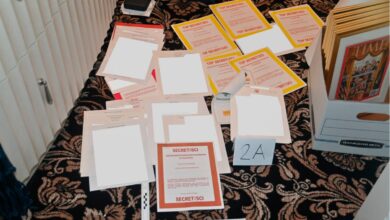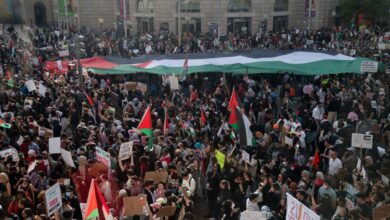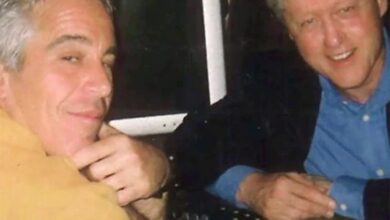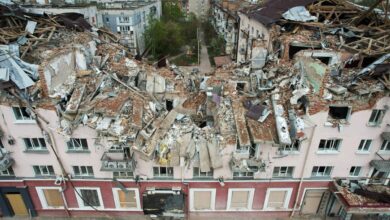‘A catastrophe for the world’: Ukraine’s farmers, on the front line of global hunger, try to save harvest
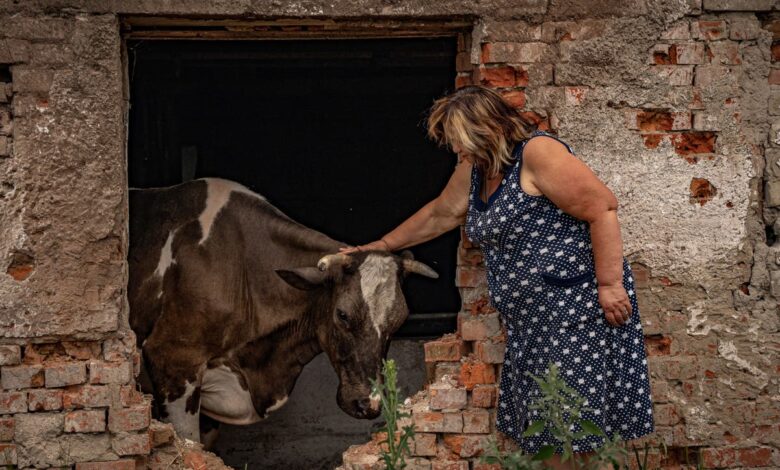
The screams of dozens of her animals being burned alive still haunt Lubov Zlobina, a farmer in the war-wrecked region of Kharkiv.
Russian soldiers were being pushed back by a Ukrainian counter-offensive after a month long occupation of her area, marked by murder, pillaging and rape. As they retreated, Lubov, the de facto head of the village, says they mined most of her 92 hectares of fields. Then they deliberately torched the main warehouse holding 140 of her cows, calves, pigs and piglets.
As the blaze tore through the pens, frantic farmhands tried to bulldoze through the back wall with tractors to free the animals. The pigs in particular could not be coaxed out. They wouldn’t leave their piglets.
“The noise of the calves, the pigs, screaming inside I cannot forget. They wanted to protect their young,” the 62-year-old says, her head in her hands, swallowing her words with sobs.
“I was outside crying, ‘get them out! get them out!’ but we just couldn’t. It was impossible. The fire was too big.”
In total, half of the animals burned to death. The sound of their murder, she says, still plays in a loop inside her head.
In a daze she walks through the farm, etched with the scars of President Putin’s war on Ukraine and his forces’ month-long occupation. The livestock pen is a charred skeleton of its former self.
Two other warehouses, that held 50 tonnes of wheat (the remains of Lubov’s 2021 harvest) were bombed. A minibus was used by drunk soldiers as target practice. Most of the animals are lame from pot-shot gunfire and shrapnel fragments.
One of her three destroyed tractors was blown up by anti-tank mines that Russians had left in her wheat and corn fields. The farmer driving it at the time is lucky to be alive: he fractured his skull and broke his legs and still walks with a limp. Another member of her staff died from a heart attack after being wounded during an artillery barrage.
Russia vehemently denies accusations by the United Nations, rights groups and civilians that its forces have violated international law or committed possible war crimes. The Kremlin has accused the Ukrainians of staging a “monstrous forgery” aimed at besmirching Moscow’s reputation in the areas which were formerly occupied by their forces.
But Lubov says during the occupation, Russian soldiers frequently ransacked this farm and others nearby. They reportedly raped at least one woman in the village and in drunken rages, Lubov says, they would shoot civilians.
“In total they killed five people in the village, execution style,” she continues blankly.
“They left the body of an elderly and partially deaf resident in the centre of the village for three weeks. The dogs had started eating it.”
Now she says the horror of the past is not her only concern. The future of the lives and livelihoods of her staff weigh on her.
There are rumours Moscow is regrouping to press another advance on the Kharkiv region, an agriculturally rich region which lies along the border with Russia. They fear the village could be occupied again.
Smoke streams over a sunflower field from a nearby rocket attack in Dnipro
And now is harvest time in this part of the country.
The fate of the harvest will determine the fate of countless farmers across Ukraine, nicknamed the breadbasket of the world because of its sprawling agricultural industry. And like so many shredded farms across the country Lubov’s can barely function.
With little livestock left, if she can’t harvest and sell the grain, she cannot pay any of her 10 person team on the farm and she also cannot afford to plant her next year’s crop. So the domino effect continues.
“We barely have any money. My staff got 6500 Ukrainian hryvnia [£186] from the government. We were able to add 2000 [£60] more. But that’s less than half of their monthly salary,” she says.
The harvest begins in Dnipro under increasing amounts of missile fire
The noise of the calves, the pigs, screaming inside I cannot forget. They wanted to protect their young

